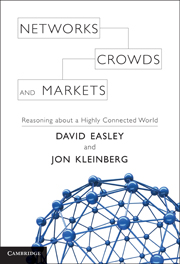Book contents
- Frontmatter
- Contents
- Preface
- 1 Overview
- Part I Graph Theory and Social Networks
- Part II Game Theory
- Part III Markets and Strategic Interaction in Networks
- Part IV Information Networks and the World Wide Web
- Part V Network Dynamics: Population Models
- Part VI Network Dynamics: Structural Models
- Part VII Institutions and Aggregate Behavior
- 22 Markets and Information
- 23 Voting
- 24 Property Rights
- Bibliography
- Index
22 - Markets and Information
from Part VII - Institutions and Aggregate Behavior
Published online by Cambridge University Press: 05 June 2012
- Frontmatter
- Contents
- Preface
- 1 Overview
- Part I Graph Theory and Social Networks
- Part II Game Theory
- Part III Markets and Strategic Interaction in Networks
- Part IV Information Networks and the World Wide Web
- Part V Network Dynamics: Population Models
- Part VI Network Dynamics: Structural Models
- Part VII Institutions and Aggregate Behavior
- 22 Markets and Information
- 23 Voting
- 24 Property Rights
- Bibliography
- Index
Summary
In this final part of the book, we build on the principles developed thus far to consider the design of institutions and how different institutions can produce different forms of aggregate behavior. By an institution, we mean something very general — any set of rules, conventions, or mechanisms that synthesizes individual behavior across a population into an overall outcome. In the next three chapters, we will focus on three fundamental classes of institutions: markets, voting, and property rights.
We begin by discussing markets, and specifically their role in aggregating and conveying information across a population. Each individual participant in the market arrives with certain beliefs and expectations — about the value of assets or products, and about the likelihood of events that may affect these values. The markets we study will be structured so as to combine this set of beliefs into an overall outcome — generally in the form of market prices — that represents a kind of synthesis of the underlying information.
This is part of a broad issue we have seen several times so far: the fact that individuals' expectations affect their behavior. For example, we saw this in Chapter 8 with Braess's Paradox, where the optimal route depends on which routes others are expected to choose; in Chapter 16 on information cascades, where people draw inferences about the unknown desirability of alternatives (restaurants or fashions) from the behavior of others; and in Chapter 17 on network effects, where the unknown value of a product (a fax machine or a social networking site) depends on how many others are also expected to use the product.
- Type
- Chapter
- Information
- Networks, Crowds, and MarketsReasoning about a Highly Connected World, pp. 607 - 644Publisher: Cambridge University PressPrint publication year: 2010



